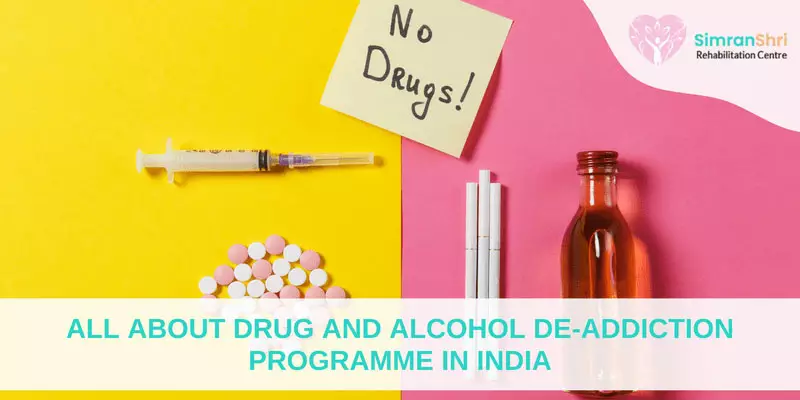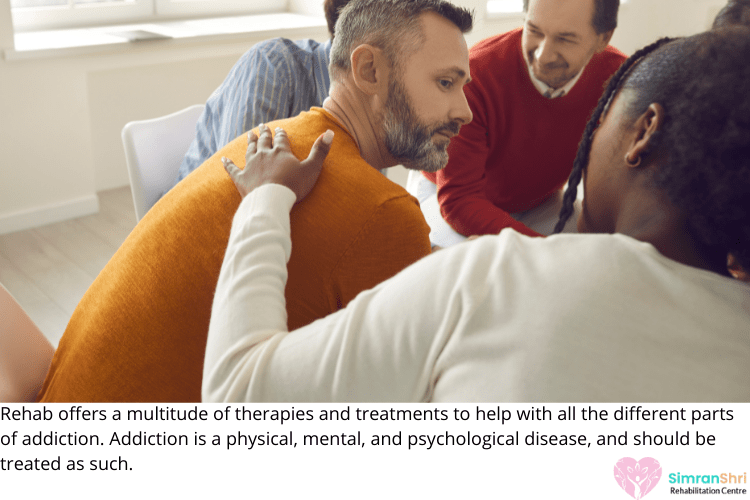

De-addiction programs circle all the aspects of one's life influenced by substance use disorder. These include one's physical, mental, and social health. The following outline of a drug de-addiction program is fluid; it gets updated as per the changes in one's needs. Scroll down to get acquainted with the main elements of a treatment program.
The mental health professional will first review the medical history, drug use pattern, and mental health disorders. Based on these assessments, a summary of the reporting problems and recommended drug de-addiction program that entails medication and psychotherapy is created.

A list of problems that one needs to be targeted in the drug rehabilitation Centre and a brief report of the troublesome signs and symptoms illustrating the individual's problem. For instance, uncontrollable urges to consume alcohol or not being able to cut down the intake. Multiple problems in relationships due to substance abuse. Consuming large quantities of alcohol multiple days a week.
Once the problems are enunciated, the drug and alcohol de-addiction program devise a solution. The goals are in the form of brief statements about what an individual wants to change and should:
● Based on the list of issues (a minimum of one should relate to drug abuse)
● Broad (Instead of focusing on removing a behaviour, the aim should be
Goals are what one wants to achieve; objectives are the concrete measures one needs to take to materialize the goals. The best approach to Objectives is "SMART."
● Specific
● Measurable (observable actions)
● Attainable (reasonable to materialize within a time frame)
● Relevant (related to the problem of the list of issues)
● Time-limited (have a set time limit for completing the task)
For example, most drug de-addiction programs in India insist on taking part in weekly group therapy sessions, following the prescription regularly, taking medications on time, practice the 12-step approach to treatment.
Interventions are the methods used by mental health professionals to facilitate meeting each objective. For example, if an individual has a problem of inability to reduce alcohol consumption, their goal is to develop healthy coping styles. Then to achieve this goal, they will have to meet the objective of attending weekly counselling sessions. The mental health professional will refer an individual to the Alcohol Rehabilitation Centre, monitor them attending the weekly sessions, and help them resolve any barriers they face, such as childcare services or access, etc.
A mental health professional keeps comprehensive notes in one's chart to track progress and evaluate if the de-addiction program is working well. This generally includes the details of how an individual responds to their treatment, the changes in their condition, and the adjustments made to the plan. The drug and alcohol de-addiction program also include journaling sessions that include individuals to reflect and write about their feelings, thoughts, and behaviours.
During the drug de-addiction program in India, mental health professionals discuss aftercare and relapse prevention. Once the treatment program is complete, the post-discharge treatment plan includes:
● Regularly attend the twelve-step support groups and meetings.
● Ongoing therapy with a psychologist
● Taking prescribed medicines for disorders.
Individuals struggling with drug addiction need a drug-free atmosphere surrounded by people that hold them responsible for achieving their goal of getting sober. De-addiction program begins with detoxification, helps one get rid of the substance toxins and residues, and manages the withdrawal symptoms. Not every individual requires detox, and neither is detox the only treatment for breaking the shackles of addiction. Once the detox is over, the actual work for addiction recovery commences.
Once individuals abstain from drug use, they can think clearly and learn about their addictions. Gaining an insight into addiction involves learning about the events, individuals, habits, and sensory experiences that trigger controllable cravings. Most drug de-addiction programs help an individual recognize these triggers such that they can make deliberate efforts to avoid and deal with the cravings effectively.
There are various causes and reasons why an individual gets addicted to drugs; it is necessary to identify the reason for one's addiction. Is it a way of coping with stress? Are you using it to get emotionally numb to avoid the physical or psychological pain you are bearing? Is alcohol being used as a means of avoiding responsibility? Is it due to peer pressure? It is essential to trace your cause of drug dependence. Mental health professionals at drug and alcohol de-addiction programs help identify the causes for treating them effectively by developing healthy coping styles.
Most individuals that have an addiction have reported lacking discipline and self-care habits. It is indispensable for an individual seeking recovery to set and achieve goals. Regardless of whether they are seeking recovery or not, most individuals cannot set and accomplish goals. They start with great zeal but are unable to meet their goals. Continuously failing to achieve goals weakens, and individuals will make goals. Rehabilitation Centres help set short-term and long-term goals for recovery. Setting goals includes physical and psychological health, occupational, relationships, and spiritual aspirations.
Individuals struggling with addiction take little to no responsibility for their behaviour and life. Their loved ones, on the contrary, take too much responsibility. The boundaries in relationships that facilitate a healthy bond are unclear or distorted in families with an addictive pattern.
The outcome of a relationship with healthy boundaries is a survival mentality where the loved ones take up the responsibility to help cope with stress. These roles temporarily reduce the stress but also increase anxiety and confusion.
Rehabilitation Centres help resolve these problems and establish healthy boundaries.
Tags: alcohol de addiction program, de addiction program, drug de addiction program, drug de addiction program in India